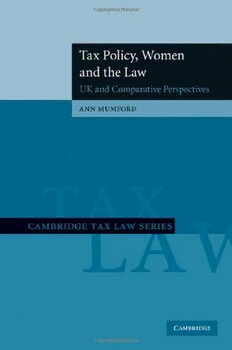
Tax Policy, Women and the Law: UK and Comparative Perspectives (Cambridge Tax Law Series) PDF
245 Pages·2010·1.544 MB·English
Most books are stored in the elastic cloud where traffic is expensive. For this reason, we have a limit on daily download.
Preview Tax Policy, Women and the Law: UK and Comparative Perspectives (Cambridge Tax Law Series)
Description:
Tax policy frequently targets the choices that women face in many aspects of their lives. Decisions regarding working away from home, having children, marrying, registering a partnership or cohabiting with a partner all entail tax consequences. The end of the twentieth century saw progress in women's legal and social equality, but many governments began to increase their reliance on the tax system as a means of influencing the choices that women make. The juxtaposition of this instrumentalist deployment of tax with persisting economic inequality for women is the starting point for this book. Employing a range of theoretical approaches, and grounding its investigations in sociological theory and cultural philosophy, it provides the foundation for a comparative, contextual consideration of the issues that arise at the intersection of women, tax policy and the law.
See more
The list of books you might like
Most books are stored in the elastic cloud where traffic is expensive. For this reason, we have a limit on daily download.
